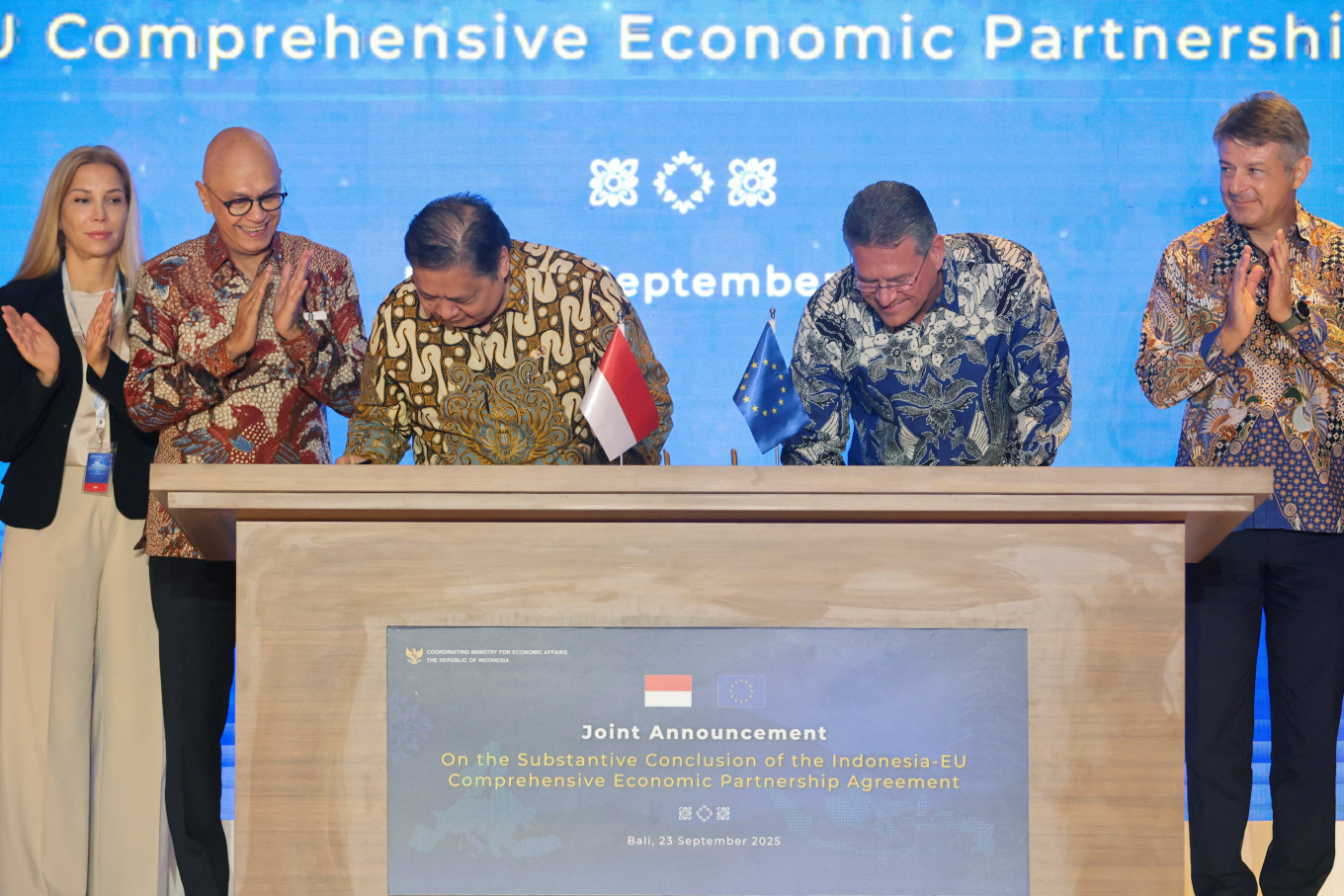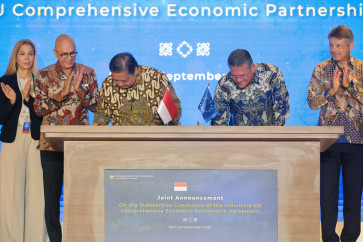Popular Reads
Top Results
Can't find what you're looking for?
View all search resultsPopular Reads
Top Results
Can't find what you're looking for?
View all search resultsFrom Brussels to Bali: Seizing the prosperous promise of the IEU-CEPA
While Tuesday's signing of the IEU-CEPA is certainly a milestone, unlocking the agreement's tremendous opportunities requires a stronger business environment through broad reforms at home.
Change text size
Gift Premium Articles
to Anyone
 Coordinating Economy Minister Airlangga Hartarto (center left) and European Commissioner for Trade and Economic Security Maros Sefcovic (center right) sign documents on Sept. 23, 2025, during a ceremony on the substantive conclusion of the Indonesia-European Union Comprehensive Economic Partnership Agreement (IEU-CEPA) in Nusa Dua, Bali. (REUTERS/Johannes P. Christo)
Coordinating Economy Minister Airlangga Hartarto (center left) and European Commissioner for Trade and Economic Security Maros Sefcovic (center right) sign documents on Sept. 23, 2025, during a ceremony on the substantive conclusion of the Indonesia-European Union Comprehensive Economic Partnership Agreement (IEU-CEPA) in Nusa Dua, Bali. (REUTERS/Johannes P. Christo)
A
fter a decade of arduous negotiations, Indonesia and the European Union signed the Indonesia-European Union Comprehensive Economic Partnership Agreement (IEU-CEPA) on Tuesday in Bali. With pens now capped, the question is larger than trade: Will Indonesia turn this deal into enduring prosperity or allow it to fade as just another headline?
Recent economic diplomacy efforts have succeeded in reducing the threat of steep United States tariffs. The potential imposition of 32 percent “reciprocal” duties has been scaled down to 19 percent, thanks to a swift, coordinated response from “Indonesia Incorporated”, the country’s cross-stakeholder economic diplomacy approach.
While this is good news, it will also lead to increased imports from the US. If not balanced by stronger exports, this could pressure our national trade surplus. This is why stimulating export growth is more important than ever, specifically by diversifying our export destinations.
Heavy reliance on a single market, no matter how favorable the terms, carries long-term risks. Expanding into nontraditional markets such as South Asia, Latin America or Africa will be critical. But such diversification takes time. That is why the IEU-CEPA matters. Europe is not just a partner of choice: It is a ready, rules-based market with high purchasing power, transparent standards and deep industrial linkages.
The journey began in 2009, when Indonesia’s president launched a vision group to explore a deeper partnership with the EU. The process formally advanced in Brussels in 2016, tested through painstaking rounds of talks. Each negotiation round was a brick, a steel beam, a careful calculation building the framework for this partnership.
In July 2025, President Prabowo Subianto met with European Commission President Ursula von der Leyen and European Council President António Costa in Brussels, giving the final political green light. The process culminated on Sept. 23 with the signing of the IEU-CEPA in Nusa Dua, transforming a distant aspiration into a concrete framework for partnership.
This new chapter in Indonesia-EU relations must now translate into tangible benefits for businesses and citizens alike.


















